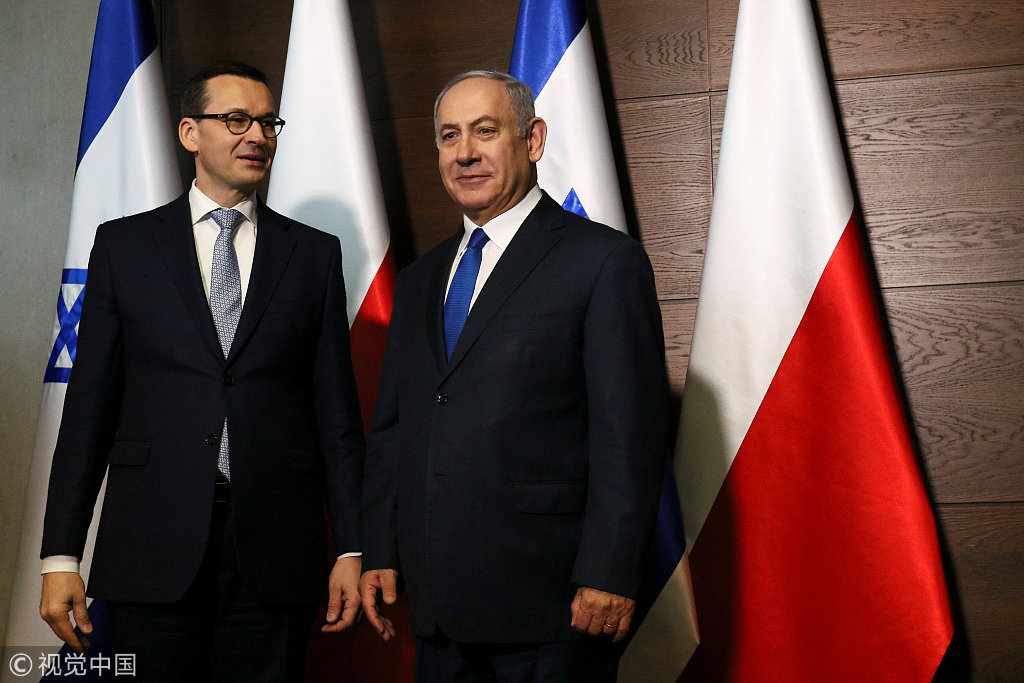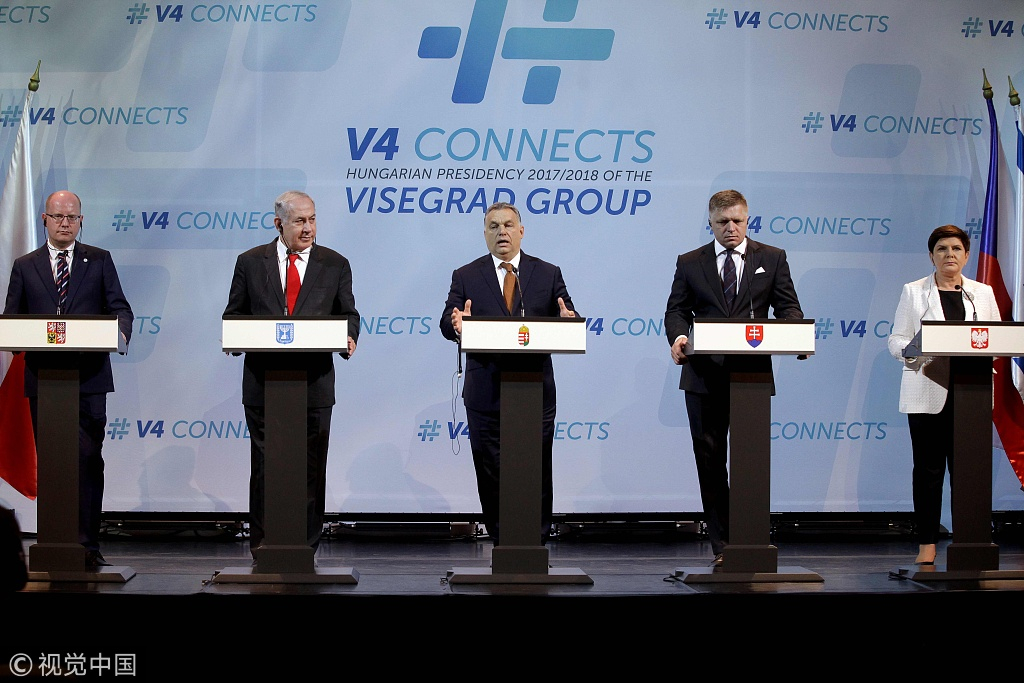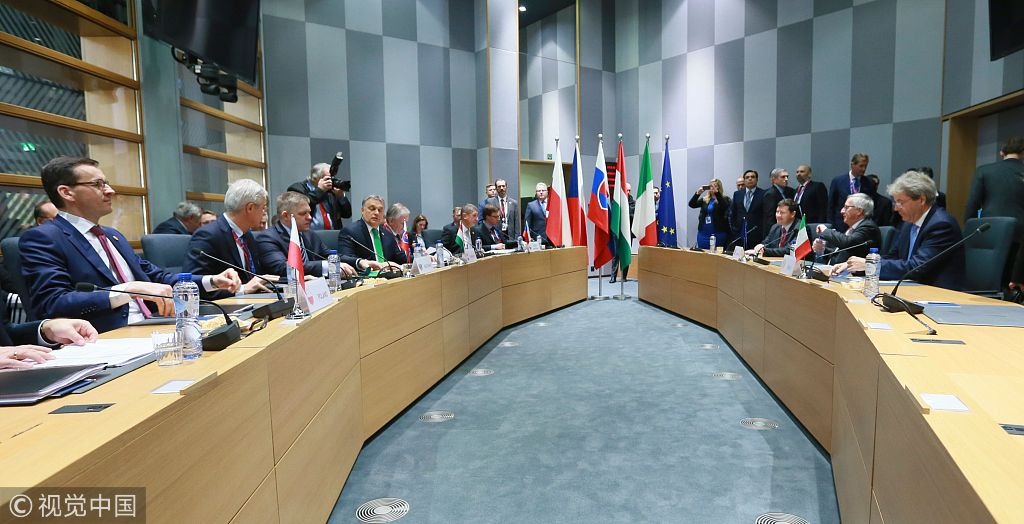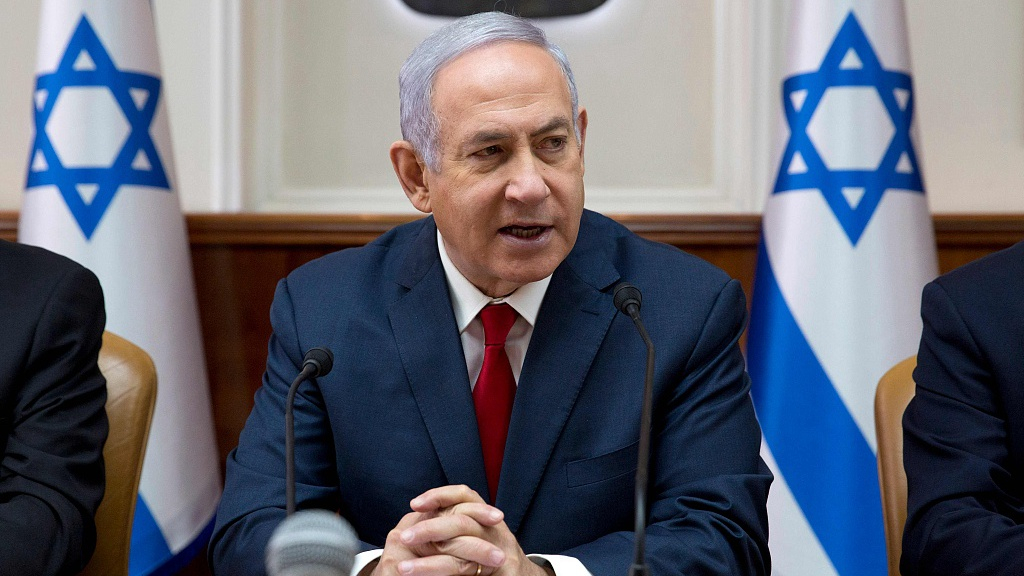Polish Prime Minister Mateusz Morawiecki Sunday announced the cancellation of a trip to Israel, overshadowing a two-day meeting of central European countries in Jerusalem that Israel Prime Minister Benjamin Netanyahu has pushed for a long time.
The last-minute notice came following a quarrel over comments attributed to Netanyahu in Warsaw on Thursday.
Speaking about the Holocaust, the Israeli premier said that “Poles” collaborated with the Nazis during World War Two, a statement translated into English as “the Poles” which was then construed as a reference to the entire nation.

Israeli Prime Minister Benjamin Netanyahu poses for pictures with Poland's Prime Minister Mateusz Morawiecki during the Middle East summit in Warsaw, Poland, February 14, 2019. /VCG Photo
Israeli Prime Minister Benjamin Netanyahu poses for pictures with Poland's Prime Minister Mateusz Morawiecki during the Middle East summit in Warsaw, Poland, February 14, 2019. /VCG Photo
Warsaw last year passed a law making it illegal to accuse the Polish nation or state of complicity in the Nazi Holocaust.
Netanyahu's office later released an audio clip of his exact statement and issued a clarification, which the Polish government accepted.
Although Poland downgraded its delegation to the Visegrad Group (V4) summit scheduled from Monday, it is still the first time for V4 countries (Hungary, Poland, the Czech Republic and Slovakia) to have a meeting outside of Europe.
Win-win situation
Since 2017, relations between the V4 and Israel have been swiftly changing. They have found emerging convergence on issues such as migration, security and showed a willingness to cooperate economically.
When participating in the Visegrad summit held in Budapest in 2017, Netanyahu proposed that Israel host one of the V4 regular meetings.
The desire to increase economic cooperation between the V4 and Israel has been frequently highlighted by the political leaders as a win-win situation: The V4 are looking to Israel for technological expertise and trade, and in return, they can provide a cheap, yet qualified labor force that is needed by innovative Israeli industries.

V4 presidency leader, Hungarian Prime Minister Viktor Orban (C) speaks to the press about their meeting with Israeli Prime Minister Benjamin Netanyahu (2nd L) in the main hall of Pesti Vigado cultural center during a joint press conference in Budapest, Hungary, on July 19, 2017. /VCG Photo
V4 presidency leader, Hungarian Prime Minister Viktor Orban (C) speaks to the press about their meeting with Israeli Prime Minister Benjamin Netanyahu (2nd L) in the main hall of Pesti Vigado cultural center during a joint press conference in Budapest, Hungary, on July 19, 2017. /VCG Photo
Meanwhile, Netanyahu is trying to convince the West that Israel's enemies are also their enemies and that migration is a potential threat to Europe. The fear of unwanted migration bonded V4 and Israel together, resulting in an intensification of cooperation on security affairs.
Following the Budapest summit, two “working groups” were formed: One focusing on security and combating terrorism, a second dealing with research, development and innovation.
Polish and Israeli aerospace industries also reached cooperation on unmanned aircraft and electronic warfare systems in 2017, and in 2018 founded a partnership between the respective industries to develop light attack aircraft.
Taking a side
The EU has often criticized Israel for its policies towards Palestinians especially with regard to the occupation and settlement policies in the West Bank and East Jerusalem. Although V4 on the surface is in line with the EU's approach on Middle East conflict, they sometimes did take a differing stance through certain political actions.
For instance, the Czech and Hungarian parliaments in 2015 rejected the EU's notice of labeling of Israeli settlement goods and Hungary and the Czech Republic blocked of a joint EU statement aiming to condemn the U.S. embassy's move to Jerusalem in 2018.
The V4 governments have also frequently abstained from voting in the UN General Assembly or even voted against when the Israeli-Palestinian conflict has been reviewed.

Polish Prime Minister Mateusz Morawiecki, Slovakian Prime Minister Robert Fico, Czech Prime Minister Andrej Babis, Hungarian Prime Minister Viktor Orban and European Commission President Jean-Claude Juncker and Italian Prime Minister Paolo Gentiloni attend a Visegrad group meeting in Brussels on December 14, 2017. /VCG Photo
Polish Prime Minister Mateusz Morawiecki, Slovakian Prime Minister Robert Fico, Czech Prime Minister Andrej Babis, Hungarian Prime Minister Viktor Orban and European Commission President Jean-Claude Juncker and Italian Prime Minister Paolo Gentiloni attend a Visegrad group meeting in Brussels on December 14, 2017. /VCG Photo
The Middle East issue is of a relatively low priority in V4 foreign policy. From their perspective, it is more important to maintain and strengthen the existing “two-state solution consensus” within the EU instead of intensifying measures.
In this case, while a majority of EU member states discuss potential measures placing more pressure on Israel, V4 nations would rather support Israel and could act as Netanyahu's lifeline.
During a closed-session meeting at the Budapest summit, Netanyahu harshly criticized the European Union, saying the EU's behavior toward Israel is crazy.
Experts pointed out that Netanyahu's government is now taking a side in the internal European disagreement reflecting the country's foreign policy change concerning the EU: Adopt a tougher approach toward the EU and his traditional allies on the continent and build a tighter alliance with central Europe whose governments are showing more divergence with the EU in recent years.





